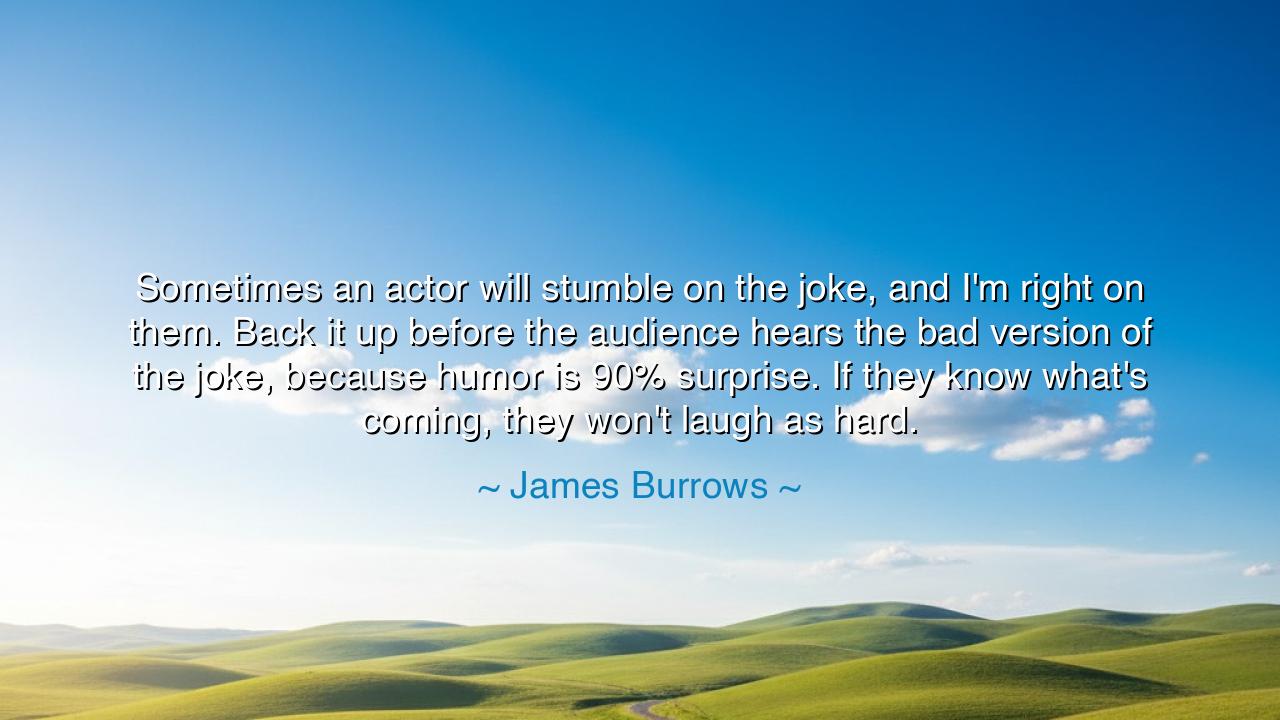
Sometimes an actor will stumble on the joke, and I'm right on
Sometimes an actor will stumble on the joke, and I'm right on them. Back it up before the audience hears the bad version of the joke, because humor is 90% surprise. If they know what's coming, they won't laugh as hard.






Hear the words of James Burrows, the master craftsman of laughter and timing: “Sometimes an actor will stumble on the joke, and I'm right on them. Back it up before the audience hears the bad version of the joke, because humor is 90% surprise. If they know what's coming, they won't laugh as hard.” In this simple teaching lies a truth that stretches far beyond the stage and the camera—it speaks to the very nature of joy, of creation, and of life itself. For what is humor, if not the art of revelation? And what is surprise, if not the heartbeat of wonder? Burrows, who shaped generations of comedy with his keen eye and disciplined soul, teaches that laughter, like beauty, depends upon the moment when the expected world collapses—and the new, the delightful, the unexpected bursts forth.
To understand this wisdom, one must first see humor as a reflection of life’s mystery. Both rely on timing—the rhythm between anticipation and discovery, between tension and release. When Burrows says that humor is 90% surprise, he reveals an eternal pattern that governs not only laughter but all human experience: the joy that comes when the unknown arrives and transforms the familiar. Just as lightning pierces the calm of night and fills it with brilliance, so does a well-timed joke strike through expectation and awaken the heart. But if the flash comes too soon, if the listener already knows what will happen, the wonder is lost, and the world remains dim.
The ancients themselves knew this art well. Aristotle, in his writings on rhetoric and poetry, spoke of “the peripeteia”—the sudden reversal, the shift of fortune that astonishes the mind and delights the soul. In drama, as in humor, the unexpected was sacred—it opened the door to truth. The comedian, like the philosopher, is a servant of surprise. He reminds us that life is not a straight road but a series of turns, some painful, some glorious, all necessary. And thus, the one who laughs is the one who accepts the dance of uncertainty—the one who welcomes surprise as the language of the divine.
Consider the story of Lucille Ball, that eternal flame of comedy, who once ruined a take on her show I Love Lucy. She had delivered the joke perfectly, but one of her gestures came too early—too predictable. She stopped the scene, smiled, and said, “Let’s do it again. The laugh’s not ready yet.” And indeed, when the moment came again, the laughter that followed shook the studio. Like James Burrows, she knew the sacred law of humor—that it lives not in the line, but in the moment of discovery. The timing, the pause, the unspoken beat before the punch—all these are the tools of revelation.
The origin of Burrows’ insight comes from his decades as a director among the greatest comedies of the modern age. He watched how audiences breathe as one, how laughter moves through them like wind through a forest. He learned that the mystery of timing—that invisible music between expectation and surprise—was not just a craft but a calling. In those seconds before the laugh, there is creation itself. Too soon, and the spark dies; too late, and the flame fades. But at the perfect moment, the world awakens, and laughter becomes a bridge between souls.
Yet this truth extends far beyond performance. Life itself is shaped by surprise, and how we respond to it determines our joy. Those who demand certainty miss the magic of the unexpected; those who fear stumbling never experience the beauty of improvisation. Burrows’ teaching is not only for actors—it is for all who live. To embrace surprise is to embrace life; to resist it is to suffocate the heart. Every moment holds the potential for laughter, for insight, for transformation—but only if we remain open to being astonished.
So, let this wisdom be passed to those who seek mastery not only of art but of existence: guard your timing, but welcome surprise. In your work, in your words, in your relationships, let there be mystery. Do not reveal the ending too soon; do not live your life by a script already known. Allow the unexpected to delight you, and allow laughter to find its rightful place between control and chaos. Just as the greatest comedians trust the rhythm of silence before the laugh, so must you trust the rhythm of uncertainty before joy.
For as James Burrows reminds us, humor is 90% surprise—and so, perhaps, is life itself. The universe laughs in its own way, through the turning of fate and the unfolding of days. The wise do not fear these surprises—they cherish them. So when your moment comes, do not stumble on the joke. Step into it, time it with grace, and let the laughter of life ring forth. For the greatest art, and the greatest living, both depend upon the courage to let the unexpected find you—and to rejoice when it does.






AAdministratorAdministrator
Welcome, honored guests. Please leave a comment, we will respond soon